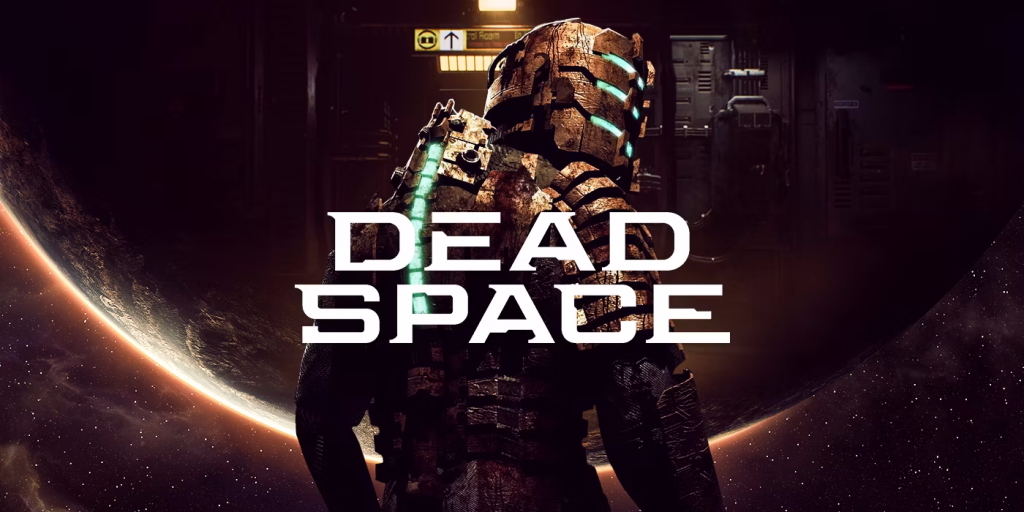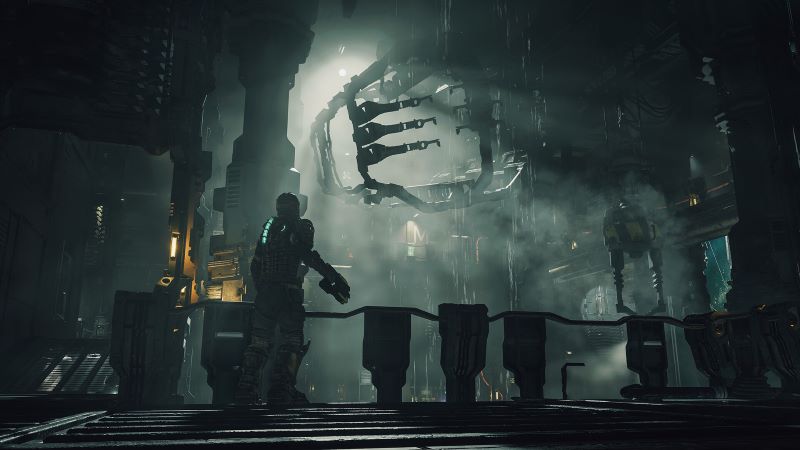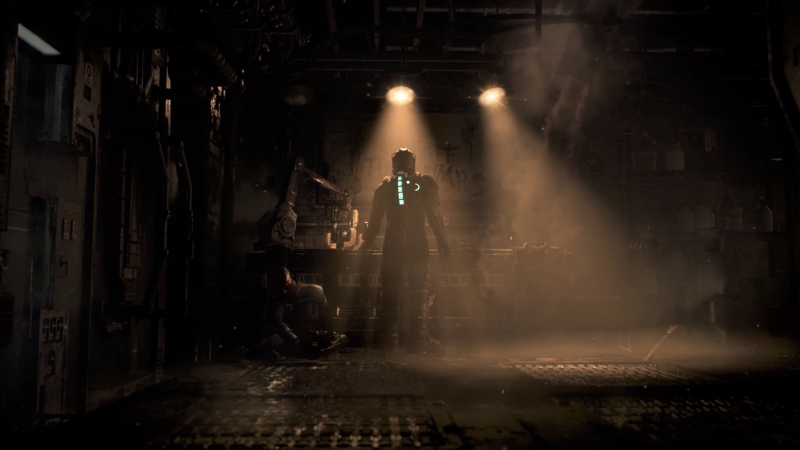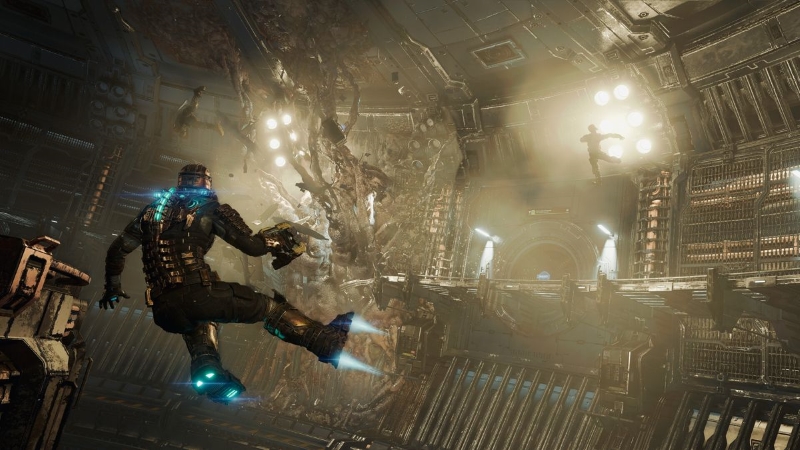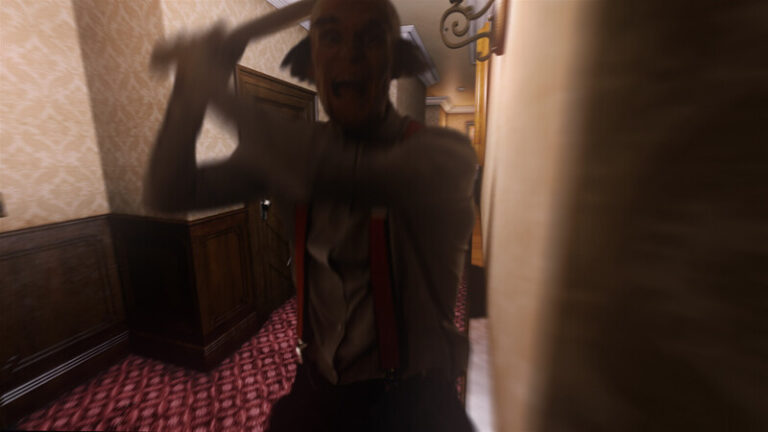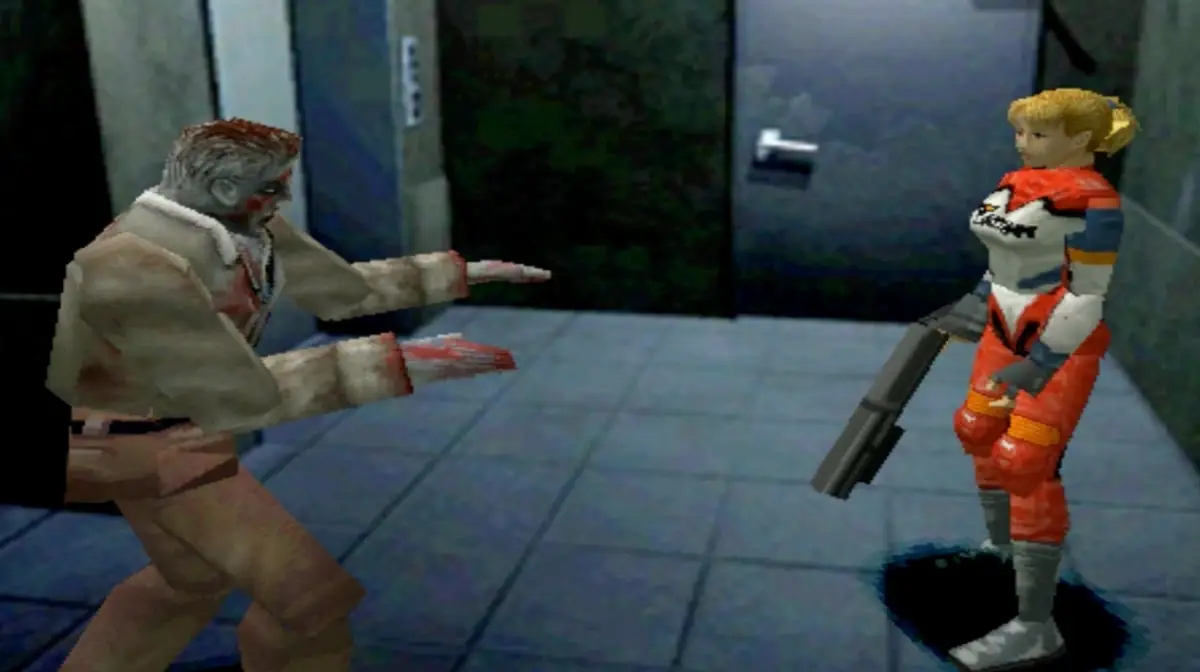In anticipation of the Dead Space remake coming out later this month, we sat down with two of the lead developers on the project to get some insight into what kinds of approaches they took while creating the remake and the future of the franchise going forward.
We chatted with Joel MacMillan, the Realization Director of the game, as well as Jo Berry, the Senior Game Writer for the project at Motive Studio, and had an enlightening discussion with them about the remake and the horror genre in general.
ROH: Hello and thanks for speaking with us about the project! Can you talk about your roles and duties on the Dead Space remake?
Joel: I’m the realization director on Dead Space remake, which is a new title for our studio. My previous experience has been in cinematics, and I previously worked on things like some of the more recent Star Wars games as a cinematic director. The way I’ve approached this project is similar to some of the things I’ve done in the past, except for, as most Dead Space players know, the cinematics are almost all done in-game or in-engine, so my take on the role here is essentially an in-world cinematic director. I work with the VFX, lighting, and other types of artists to put narrative moments together.
Jo: My official role is Senior Game Writer, so I’m responsible for the script. Since Dead Space already has an established story, a lot of what I’m doing is updating the script for Isaac to be a speaking character, including revisions to conversations and scenes as well as updating the audio logs, text logs, journals, item descriptions, and generally anything that involves text.
Joel: She’s also our native expert on Dead Space lore as well. She knows all the details of the stories from every piece of Dead Space media and has it all sorted out and organized in her head, so she’s been a great resource as we’ve worked on this project!
ROH: Can you speak more about being a writer on a remake that already has an existing script? Is it treated like a film script where every shot and action needs to be updated or are the changes on the writing side mostly related to dialogue?
Jo: This is a full revamp of the script, since having Isaac speak changes the dynamic of every scene and conversation that he’s a part of. One of the other goals was to bring in pieces of lore from the surrounding series and make it feel like one consistent piece of storytelling. There’s also a lot of great info in the post-game text logs, and we figured, since we know this info won’t show up in Dead Space 2 or 3, let’s work those into the story now. There were some overall character dynamics that needed to change and what we felt like were some missed opportunities from the original game, meaning things that they just weren’t able to implement into the story or scenes because the game development technology wasn’t quite able to support it back then.
Joel: We also wanted to make sure that the core structure of the game and the story remained intact. Since we’re fans of the original, we were very mindful of not just changing things for the sake of changing things or just to make them different. We had a strict process for determining what would be changed on the basis of making sure it would actually make the experience better than what was done in the original. Early in the development, we had some ambitions of changing some things and thinking we could do them better, but we had to step back on many of them and look at what made that thing work so well in the original and how cleverly implemented some of these things were, and we would be humbled by it and change our minds about making some of these changes. One of our overarching goals was just to update the experience for modern sensibilities since contemporary audiences have a slightly different appreciation for horror and are able to pick up on more of the cliches that were more common back in the time of the original game that aren’t as relevant now, so we wanted to update some of those things to adapt them for modern times.
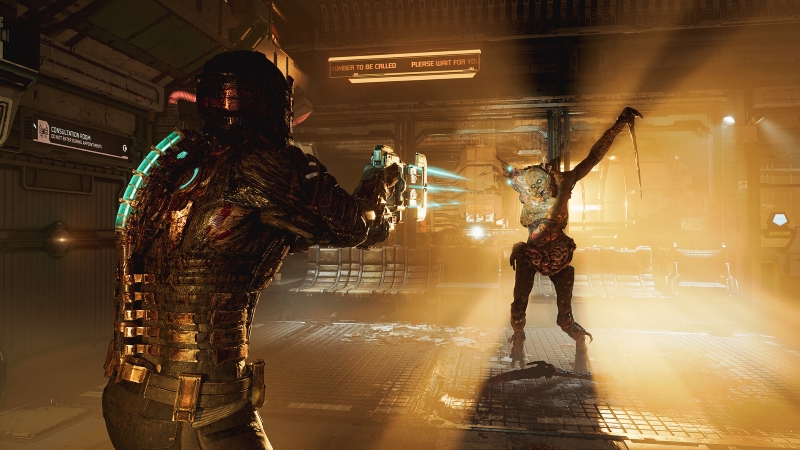 ROH: What inspired the choice of having Isaac speak more in this remake since he was a silent protagonist in the original game? Was it to fit in more with where the series went with him in Dead Space 2 and 3 or just to fit with more modern game narrative styles?
ROH: What inspired the choice of having Isaac speak more in this remake since he was a silent protagonist in the original game? Was it to fit in more with where the series went with him in Dead Space 2 and 3 or just to fit with more modern game narrative styles?
Jo: Much of that decision came more as a natural change based on the character himself. Since he is an expert, him not being able to speak in the original took away from his agency when all the other characters are telling him what to do and how to do it. We wanted to lean more into the feeling of being a space engineer, and not just in gameplay, but in motivation for the player as well. Now, instead of Hammond telling Isaac what’s wrong with a certain piece of machinery, the other characters will ask him what’s wrong and he’ll explain it. This also has a ripple effect of the character dynamics, since this also lets us focus more on what each character’s different job or role is and gives more characterization to each of them. It inspires what feels more like real teamwork in a survival situation and it brings you more into the scenes and lets you feel more immersion.
ROH: Are any of the wider narrative devices or elements being changed or updated for modern audiences or to fit more with the narrative presentation styles of modern AAA games or movies?
Joel: There are definitely some of those higher-level changes as well, for instance, we have several interesting set pieces that you didn’t really get to explore in the original, or we’re giving a new angle of experiencing them in this remake. We’ve changed a lot of the cinematic presentation of the experience, especially in things like the camera language. The original had a single locked camera perspective that generally never left Isaac’s shoulder, and we wanted to be just as seamless in that respect, but modern expectations of camera movement in games have changed so much since then.
Modern games like the newer God of War for instance, is a personal journey on an epic, grand scale. Dead Space, on the other hand, is a personal journey on an intimate scale, but we still wanted to liberate the camera a little bit from Isaac when we could to adapt to some of these modern sensibilities and de-couple the camera from the shoulder when it suited the narrative presentation. During these processes, we are constantly asking and checking ourselves, ‘Do we need to do it or are we just doing it because we can?’ We had several layers of redundancy to keep us in check and check if it makes sense. However, we still followed some rules to keep the moments authentic and not deviate too much from the original intent of showing everything from Isaac’s perspective.
Jo: For many sequences, we kept going back and asking ‘Why did they do this in the original?’ to make sure that we kept a lot of that intact. For instance, when some events happen behind glass, we looked for opportunities to make the glass a part of the scene as opposed to just being a simple physical block of where the player could move during that scene.
Joel: The technical capabilities for lighting and visual design has advanced so much, and it’s allowed us to build an even stronger atmosphere, which is obviously one of the biggest key elements to horror in any medium. Atmosphere in horror goes far beyond the typical tropes like the spooky castle in the moonlight, and there are so many other ways to present other environments with just as much effect but with more uniqueness. Obviously, Dead Space makes the cold, mechanical elements of a spaceship into a terrifying horror environment, much like one of its biggest influences, the first Alien film, which did such a great job at establishing that type of environment with horror. Alien showed scenes like the one with Brett in the mechanical chamber looking for the cat, and it all works to build up the tension. We worked hard in this remake to push beyond what was able to be done in the original game to bring those establishing environmental elements forward using the technology that we have now.
ROH: We’ve heard you’ll be changing some elements of the story or fleshing out other side stories with this remake, and we were wondering if maybe you’d be adding some additional lore from Extraction, Ignition, the Severed DLC, or any of the films or books?
Jo: Yes, in fairly small ways that just help to flesh out all the various events that were going on surrounding the story of Dead Space 1. Things like, we know who the chief of security was, but she’s not around anymore, we know that Gabe Weller was doing things on the planet during this time and we know what Eckhardt was doing in Extraction, etc. This doesn’t mean you’ll be playing as these characters during this remake or anything, but I have updated the writing to include little tidbits from the other various lore.
There are even some Dead Space 3 references hidden as well, for the very observant player who recognizes them (laughs). Any references to the other media also need to be more than just fanservice nods or ‘Hey, remember this?’ They actually need to fit into and contribute to the story and be in its rightful place. Another example is that we know because of Extraction that there’s an entire water system on the Ishimura, and even though Isaac doesn’t go there, we can have a little nod as to why he doesn’t go there without hitting the player in the face with a deadpan lore explanation from another game. It’s been really fun to try working in all these other elements and we can’t wait for fans of the series to experience them when the game is out.
ROH: After playing the original game recently, I noticed some of the dialogue is a bit dry or slightly outdated by modern writing or speaking standards since the game is almost 15 years old now. Can you talk about how you’ve updated some of those older exchanges?
Joel: One of the biggest focuses for us is making sure the characters resonated and felt relatable to a modern audience since they are the window to what we experience as players. We paid attention to this on every level, including Jo’s script and the performances. We wanted it to feel genuine and contemporary and made sure to stay away from some of the types of lines or dialogues that fell into cliché in the last 15 years.
Jo: In the original game, some of the character dynamics were meant to give a sense of paranoia and mistrust, similar to something like John Carpenter’s The Thing, but they were handled in ways that escalated far too quickly and didn’t feel natural or real. With the remake, we wanted to make sure everything mattered, including the two characters Isaac was close with at the start of the game. They died very quickly and were never really mentioned again, even though it seems likely that Isaac was very close with them and knew them quite well. We wanted to see how we could bring all of these characters’ stories forward, make them matter, and have them be impactful to the world.
We wanted Isaac to feel like a full-fledged human being with emotions and thoughts and wanted him to be a guy who people trusted and wanted to work with again. This was a unique opportunity for the player to see how he relates to everyone around him and we wanted to make sure no opportunities were left on the table, that characters made sense and mattered, and tried to make it so there’s no throw-away characters. It was even interesting that when we were recording the dialogue with Gunner Wright (the voice actor of Isaac in Dead Space 2 and 3, who returned to voice Isaac in this remake) he was mentioning that he wanted to get a lot of the emotional nuance right in his performance, since if he didn’t sound like he was scared, exhausted, or hurt, the player wouldn’t feel that either.
ROH: Will you be updating the music cues to fit better with modern game aesthetics or just re-recording the original score as it is?
Jo: We are still keeping a good amount of Jason Graves’ original score, with Trevor Gureckis coming in to update or add some things to it as well as composing some additional material. So, the original music will be there, but it’s not just transplanted from the original, even though the main themes of Dead Space will be there. Trevor’s new compositions are also great and mesh perfectly with the Dead Space world and Jason’s original score. Several of them have stuck with me during this development and testing process.
Joel: In a general sense, the soundscape is much more tactile in its sound design, where we were able to use so much more of the modern spatial audio techniques that give a great sense of the geography which helps contribute to the horror and immersion as well. Some of this also includes how and when the music cues will be used in certain situations, and we think it works very well for the project.
ROH: Can we expect the game to be about the same length or are there any gameplay segments that will be added in the remake?
Jo: It’s fairly comparable to the original in a general sense, though there are also some extra side quests. One thing that may make the experience longer for more curious players is that you can also just go around and explore any part of the Ishimura at most points, unlike in the original. Instead of each area being clearly separated with getting on the tram and going to a new area, it’s all generally open and you can revisit old rooms or places you couldn’t reach before if you want to.
Joel: Because of this, we also have a new system called the Intensity Director. Since you now have more ability to go revisit different areas of the ship at any point, instead of any areas you’ve already been through being cleared out of necromorphs and threats, we wanted to add more content to the rooms you re-visit. We developed it as a feature that gauges the player’s play style and spawns content dynamically to keep you engaged as you explore. For return players that might know where all the events and scares will come from, this provides a dynamic randomness, with more than 1200 unique events that could come up whenever you enter an area, including spawning new enemies, new scares, new audio elements playing in the distance, etc.
ROH: Are there currently any plans to remake the rest of the series as well or is this just an isolated project for now? Do you know of any potential plans for making a new, original Dead Space game in the future?
Jo: (laughs) This game is currently taking all of our energy, so all of our focus is on getting the game done right now. Maybe after this one is out, we’ll start talking about any other potential future for it, but we’ll need a least a minute to unwind after this!
Joel: Obviously, we would love the opportunity to move forward and do more with the franchise, but there are so many variables that are out of our control with that, so we’ll wait to see the reception of this game first. It’s also great since right now is a huge time for horror, and as a genre, it feels like it’s in a very healthy place with streaming services letting us revisit some of our old favorite horror films with ease, and the audience for it has widened. I’m really happy that it feels like more people than ever have grown to appreciate the cathartic element of horror and to have that release and be scared. Especially after our recent pandemic, it feels like horror has become more of a welcome part of many people’s lives and the release that we can get from consuming horror media feels more relieving than ever.
Jo: Horror games also provide us with yet another unique experience where you’re the one who gets to be in control of the experience where you’re being frightened, but you can walk away when you need to and maintain some sense of control while also being immersed in the horror. That can be a healthy tool for many people for navigating our society right now.
Special thanks to both Joel MacMillan and Jo Berry for taking the time to be interviewed. We had a great time discussing the Dead Space remake and the horror genre with them.
We can’t wait to play Dead Space when it officially launches on January 27, 2023. It’s available now to pre-order on PlayStation 5, Xbox Series X|S, and PC via the EA App, Steam, and Epic Games Store.

 IDOLxISxDEAD
IDOLxISxDEAD